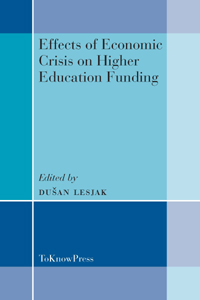 Edited by Dušan Lesjak
Edited by Dušan Lesjak
March 2017, 172 pp.
Printed
ISBN 978-961-6914-18-5
24.00 EUR
The recent deep and long-term economic crisis greatly challenged European public funding-based higher education systems. This monograph examines how public higher education funding in European countries varied during the economic crisis in relation to how strongly countries were affected by the crises and how much importance they put on higher education funding compared to other users of public funds.
In the empirical analysis, countries are therefore clustered into two groups depending on severity of economic crisis and its impact on their economies and public finances. Empirical analysis has shown that during economic crisis, higher education sector has undergone cuts in public spending as well, but with a certain delay and mainly in economically more affected countries. Changes in public funding were examined by using indicators of public expenditure from public finance statistics, as well as by comparing expenditures per student and the share of expenditure allocated for student aid. We also studied changes in mechanisms and instruments of higher education funding during economic crisis. In many countries, governments introduced more innovative funding mechanisms that include elements of competition and performance. Universities themselves also responded to changed economic and social conditions by efforts to improve their own efficiency and effectiveness.
Our research thus documents how economic crisis had left a great mark on European higher education and also increased the gap between economically less and more affected countries.
